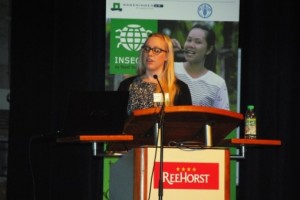
With a growing global population and steadily diminishing resources, future food security is becoming an increasingly important challenge. As a partner in the EU funded PROteINSECT project, Minerva is at the forefront of encouraging thinking around the utilisation of insect protein for animal feed.
Bringing together scientists, farmers and feed industry experts from around the world, PROteINSECT is investigating the potential of fly larvae as an alternative protein source in feed for poultry, pigs and fish. Minerva’s role within the project is to develop a pro-insect platform in Europe by engaging with key stakeholder groups including policy makers and consumers.
Minerva attended the first ever international ‘Insects to Feed the World’ conference along with other members of the PROteINSECT team. Minerva gave presentations on the topics of consumer acceptance and legislation issues – helping to inform the audience about two of the major challenges currently facing the introduction of insect protein into the food chain.
Throughout the conference, Minerva used social media to reach out to fellow delegates and promote the project. In addition, Minerva worked to build links with key stakeholders and connect with other initiatives engaged with the topic … not to mention sampling its first mealworm muffin!
Minerva created a short video to highlight the activities of PROteINSECT at the conference.
Moving forward, Minerva will continue to provide strategic communications support to the PROteINSECT project, enabling the development of a positive and receptive platform for the use of insect protein as a feed material in Europe. It is now in the process of organising a key-opinion leader round table meeting on the topic of safe and sustainable utilisation of insect protein in animal feed, which is due to take place this November.